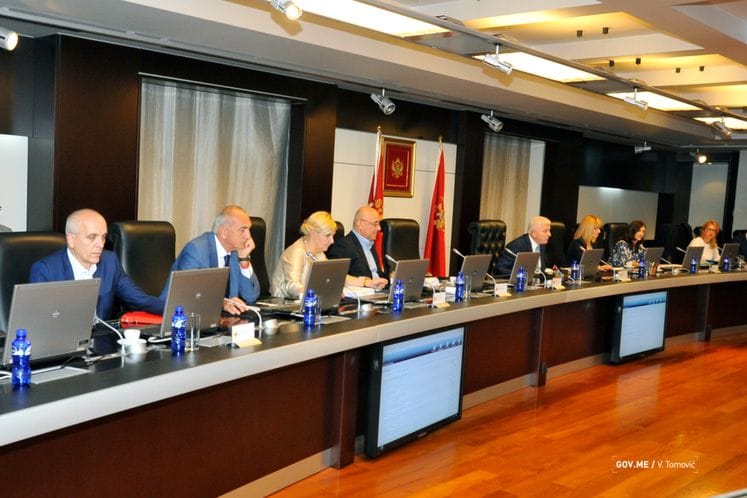- Government of Montenegro
Competitiveness Council: Local governments will be...
Competitiveness Council: Local governments will be obliged to obtain prior approval from Government when adopting regulations on fiscal matters

Podgorica, Montenegro (27 July 2018) -- At its third session, the Competitiveness Council reviewed the Fiscal Analysis on national and local levels, drafted by the Chamber of Commerce of Montenegro, the Initiative for Amending the Law on Administrative Fees and the Initiative for Amending the Law on Local Communal Fees.
The Analysis shows that the economy in Montenegro is burdened with numerous fees prescribed by both levels of government - state and local ones, which significantly burden the business, making it a negative component of the business environment. The discussion pointed out that the Analysis has shown that there is no available unified information on local level frees, and that local governments apply different fees, and that unforeseen burdens by local governments pose a significant business barrier and undermine the favourable business environment the Government seeks to create.
The Ministry of Finance was tasked, in accordance with the submitted initiatives, to draft the Draft Law Amending the Law on Administrative Fees and the Draft Law Amending the Law on Local Communal Taxes. The same ministry was tasked, together with representatives of employers' associations, to analyse in detail the justification of the existence of fiscal identities identified by the Fiscal Analysis on national and local levels, as well as the need to amend the relevant regulations.
The Council instructed the Ministry of Finance to establish, as part of the amendments to the Law on Financing Local Governments, the obligation for local self-government units to obtain prior approval from the Government of Montenegro when adopting regulations on fiscal matters.
It was concluded that the proposals for amending the Law on Administrative Fees and the Law on Local Communal Fees should be submitted to the Competitiveness Council for consideration prior to their consideration at the Cabinet session.
The Council considered the adoption of the Report on the implementation of the Economic Reform Programme of Montenegro for 2018 - 2020 for the first six months of 2018.
The report stated that strong economic growth in Montenegro in the first five months of 2018 contributed to the growth of employment, i.e., to the reduction of unemployment, so that the average number of employees in the first five months of 2018 was 182,367 persons or 1% more than in the same period of 2017. The trend of unemployment reduction continued, and the unemployment rate in the first quarter of 2018 was 16.1%, which is 1.3% lower than in the first quarter of 2017. According to administrative data, on 28 May 2018, the registered unemployment rate was at the level of 19% and it was lower by 3.14% compared to the same day of the previous year.
Council member Gordana Radojević of the Statistical Office of Montenegro (MONSTAT) informed the Council about the latest favourable economic trends according to which in the first half of this year the growth of export of goods amounted to 20%. Exports of goods, she continued, are growing faster than imports, and there has been an increase in the export of aluminum and iron the export of agricultural products increased significantly, that the electricity production incresed by 117% compared to the same period last year, while the growth of pharmaceutical products exports increased by 100% compared to the first half of 2017.
President of the Council, Prime Minister Duško Marković, described the latest results as encouraging, pointing out that this means that we exceeded the projections.
"We need to make every additional effort in key sectors to maintain this trend," the Prime Minister stressed, adding that it is especially encouraging that the unemployment rate is decreasing.
Upon the initiative of the Union of Employers of Montenegro, the Council reviewed and adopted Information on the abuse of temporary inability to work of the employee and defining the system of control of this abuse. The Ministry of Health and the Ministry of Labour and Social Welfare were tasked, together with the Union of Employers of Montenegro, to consider the possibility of adopting appropriate bylaws of the Law on Health Insurance, which will regulate the control of the misuse of temporary inability to work.
Today's session adopted the document "White Book" - the Report of the Foreign Investors Council in Montenegro on the investment climate in the country, with the views of the relevant institutions. The document analyses laws that are crucial for the business environment (Labour Law, Company Law, Spatial Planning and Construction Law, Consumer Protection Law, Foreigners Law, Health Insurance Law, Law on General Administrative Procedure, Law on General Administrative Procedure Deposit Protection, Law on Property and Legal Relations, Law on Public Procurement, Law on Bankruptcy and Law on Public-Private Partnership). Recognising the importance of foreign investment for the economy, a review of the views of key institutions regarding the remarks of the Foreign Investors Council was prepared.
The Council considered and adopted the Information on conducting trainings for the application of the Impact Assessment (RIA) for the period January - July 2018. In order to improve the quality of the implementation of regulatory impact analysis, the Ministry of Finance is organising trainings for officials at state and local levels involved in drafting regulations.
The Competitiveness Council reviewed and adopted the Information on the Economic Freedom Index 2018 by the Heritidz Foundation, Information on Credit Rating Assessment of Montenegro by Moody's and Standard & Poor's, and the Information on Corruption Perceptions Index 2017 by the Transparency International.
PUBLIC RELATIONS SERVICE OF THE GOVERNMENT OF MONTENEGRO
